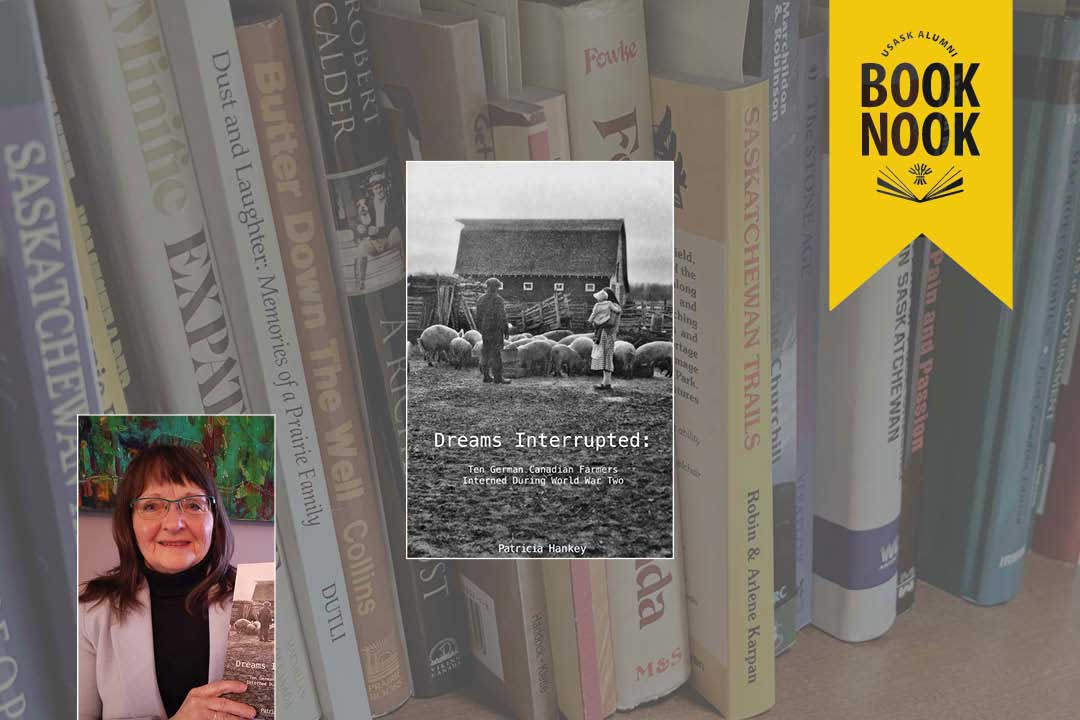
Alumni Book Nook: Patricia Hankey (BMusEd’74, BA’04)
Patricia Hankey’s passion for 20th-century history led her to write and self-publish a book, Dreams Interrupted: Ten German-Canadian Farmers Interned During World War Two
University of Saskatchewan (USask) graduate Patricia Hankey (BMusEd’74, BA’04) earned her first degree at USask’s College of Education—a Bachelor of Music in Music Education—50 years ago, making her one of this year’s Golden Grads. She later returned to USask and pursued a Bachelor of Arts in history at the College of Arts and Science, earning her second USask degree in 2004—30 years after her first Convocation ceremony.
Hankey worked as an educator and currently lives in Lloydminster, Alberta. Her self-published book, Dreams Interrupted: Ten German-Canadian Farmers Interned During World War Two, sheds light on a chapter of Saskatchewan history dating back to the Second World War.
What is the focus of your book?
Between 1939 and 1942, 10 German-Canadian farmers from the Goodsoil, Sask., area were interned as “enemy aliens” for two to five years. They were never charged or given a trial. This book details the social, political, and economic conditions of the time which enabled this to happen and has biographies of the 10 men. It also includes the translated minutes of the meetings of the Goodsoil chapter of the Deutsch Bundt from 1935 to 1939.
It was important to me to tell this story because I remembered some of these men from when I was growing up. One man lived just down the street from us and some others attended church services. My parents operated the post office out of our house, so we saw most members of the community at some time. I think it was also important to me because I realized the disservice these men suffered because of their ethnic background.
You earned degrees in music education and history at USask. Why did you want to pursue those areas of study?
I absolutely loved music and realized that I was quite good at it. I had participated in music festivals and was always strongly encouraged by my parents. History was my second love, particularly 20th-century history. My grandfather was in the First World War and my dad in the Second (World War), so there was a very personal connection to the events of the 20th century.
You self-published your book, Dreams Interrupted. What was the self-publishing process like?
Self-publishing seemed to be the easier option for me. I went to a workshop about having your book published and it seemed to involve a lot of other people and take a long time for minimal financial gain. I was confident in my own writing and editing skills—I taught high school English for many years—and knew that my book was for a niche market, and I wouldn’t be selling thousands of copies.
You mentioned that a lot of research went into your book. What was that process like?
The research for this book seemed never-ending! What must be understood is that I had absolutely no idea that it would end in a book. I simply started to find information to satisfy my own curiosity. I gradually realized that I had a growing collection of information and that perhaps this information should be shared with others. The research time was at least 10 years. It seemed that every time I thought I was finished some new and interesting information would surface.
What response have you received from readers?
I have received an unexpected positive response from readers. So many people are shocked to find out that this actually happened, and I receive a lot of appreciation for the work I’ve done. It is not an easy book to read because it is page after page of translations of articles, minutes of meetings, government documents, etc. But long after I’m gone, I hope someone who’s interested can go through my book and find the information they are looking for, and that this part of Saskatchewan and Canadian history is not forgotten.


